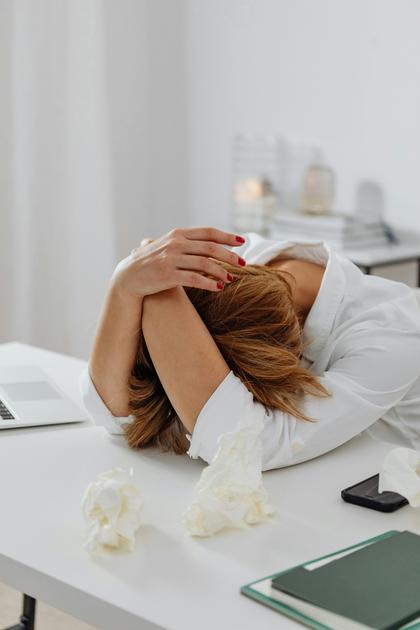Fühlen Sie sich oft von Angst und Stress überwältigt? Viele Frauen erleben in unterschiedlichen Lebensphasen Herausforderungen, die mit Melatonin und der Regulierung von Schlaf und Angst zusammenhängen. In diesem Artikel teilen wir praktische, natürliche Strategien, die helfen können, Stress abzubauen und einen erholsamen Schlaf zu finden.
The Role of Melatonin in Stress Management
Melatonin, often referred to as the sleep hormone, plays a vital role in regulating sleep-wake cycles. Its production is influenced by light exposure, with higher levels at night promoting restful sleep. For women over 30, fluctuating hormone levels can sometimes lead to disruptions in melatonin production, thereby impacting sleep quality and anxiety levels. By understanding how melatonin functions, women can take proactive steps toward managing stress and anxiety.
Research shows that adequate melatonin levels not only promote better sleep but also help in reducing anxiety, creating a calming effect on the mind. When melatonin levels are optimal, women may find themselves feeling more relaxed and better equipped to handle daily stressors.
How Sleep Affects Anxiety
Quality sleep is essential for maintaining emotional balance. Poor sleep can lead to increased levels of anxiety, creating a cycle that is difficult to break. Women often experience unique sleep challenges due to hormonal changes, especially during menstrual cycles, pregnancy, and menopause. During these times, sleep can be elusive, and anxiety levels may surge.
When sleep is compromised, the brain’s ability to regulate emotions diminishes. Neurotransmitters that help manage mood, such as serotonin, can be thrown off balance, leading to heightened feelings of anxiousness. Therefore, prioritizing quality sleep is crucial for women who wish to manage their anxiety effectively.
Natural Methods to Boost Melatonin
There are several natural methods women can employ to enhance melatonin production:
- Limiting Light Exposure: Reducing screen time from phones and computers at night can help signal the body to produce more melatonin.
- Creating a Sleep-Friendly Environment: A dark, quiet, and cool room promotes better sleep.
- Establishing a Consistent Sleep Schedule: Going to bed and waking up at the same time each day helps regulate the body’s internal clock.
- Incorporating Melatonin-Rich Foods: Foods like cherries, grapes, tomatoes, and nuts can support melatonin production naturally.
Relaxation Techniques for Reducing Anxiety
Incorporating relaxation techniques into daily routines can significantly lower anxiety levels. Some effective methods include:
- Deep Breathing Exercises: Taking slow, deep breaths can help calm the nervous system.
- Yoga: This practice not only promotes physical well-being but also encourages mindfulness and stress relief.
- Progressive Muscle Relaxation: This technique involves tensing and then relaxing different muscle groups to relieve tension.
- Visualization: Imagining a peaceful scene can help distract from anxious thoughts and promote relaxation.
Why Women Are Especially Prone to Anxiety
Women may be predisposed to experience higher levels of anxiety due to a mix of biological, psychological, and social factors. Hormones, particularly estrogen, can affect brain chemistry and emotional regulation. Additionally, women often manage multiple responsibilities, which can contribute to stress and anxiety.
Social pressures, such as balancing work and family life, can amplify these feelings. Women may also be more likely to experience certain life events—like pregnancy or caring for aging parents—that can trigger anxiety episodes, highlighting the importance of addressing these issues proactively.
The Impact of Stress on Women in Daily Life
Stress can take a toll on women’s health, manifesting in physical, emotional, and psychological forms. It can lead to issues like headaches, fatigue, and digestive problems. Ongoing stress affects women’s relationships and overall quality of life.
Moreover, chronic stress can lead to significant lifestyle changes that further exacerbate anxiety. Understanding the sources of stress in daily life is key to managing them effectively. By identifying triggers, women can develop tailored coping strategies to mitigate stress.
Mindfulness and Meditation: A Path to Inner Peace
Practicing mindfulness and meditation can be powerful tools for women seeking to combat anxiety. These techniques allow individuals to focus on the present moment, reducing the tendency to ruminate on negative thoughts.
Simple practices such as guided meditation or mindfulness exercises can foster a sense of calm and clarity. Over time, these techniques can help rewire the brain to respond to stressors in a healthier way, leading to reduced anxiety and increased resilience.
The Importance of a Healthy Sleep Rhythm
A consistent sleep rhythm is crucial for mental health. Women should prioritize establishing a routine that allows for adequate rest. Sleep is not merely a rest period; it’s essential for emotional regulation and cognitive function.
Establishing good sleep hygiene, such as avoiding caffeine in the evening, keeping a regular sleep schedule, and creating a calming pre-sleep routine, can all contribute to better sleep quality and, ultimately, lower anxiety levels.
Nutrition and Melatonin: What You Should Know
What we eat can profoundly affect our sleep quality and melatonin levels. Diets rich in magnesium, omega-3 fatty acids, and vitamin B6 can aid in melatonin production. Foods like spinach, salmon, nuts, and seeds should be included for optimal results.
On the other hand, limiting sugar and caffeine, especially later in the day, can prevent spikes in energy that disrupt sleep. Understanding the connection between diet and sleep is an essential step toward managing anxiety.
Community and Support for Women in Difficult Times
Having a support system is invaluable. Engaging with friends, family, or support groups can provide women with a safe space to share their feelings and experiences. Connecting with others facing similar challenges can foster a sense of belonging and help alleviate feelings of isolation.
Encouraging open conversations about anxiety and mental health can empower women to seek help and develop coping strategies. Community support is a crucial element in managing stress and anxiety effectively.
Frequently Asked Questions (FAQ)
1. Why do menopause symptoms cause sleep disturbances?
Hormonal changes, particularly the drop in estrogen and progesterone, can disrupt the natural sleep cycle and lead to insomnia.
2. How does stress impact sleep during menopause?
Stress raises cortisol levels, making it more challenging to fall and stay asleep. Many women report nocturnal rumination and restlessness.
3. What natural remedies help with sleep disturbances during menopause?
Herbs like chamomile, hops, and valerian, along with breathing exercises, meditation, and aromatherapy with lavender, can promote sleep.
4. How does diet influence sleep?
A balanced diet rich in magnesium, omega-3 fatty acids, and complex carbohydrates stabilizes blood sugar levels and supports restful sleep.
5. Should I seek medical help for persistent insomnia?
Yes. If sleep issues persist or are accompanied by severe anxiety, depression, or exhaustion, it is essential to seek medical advice.

